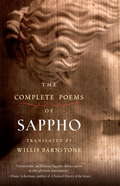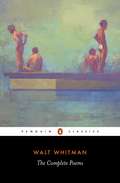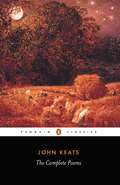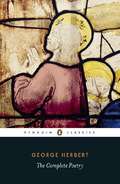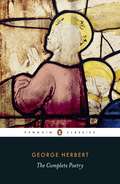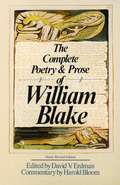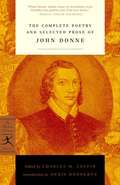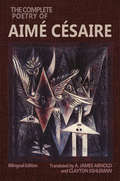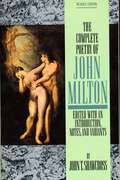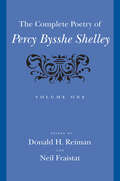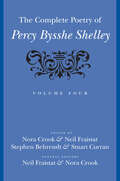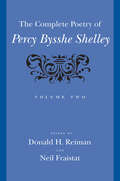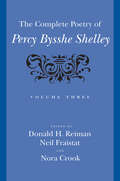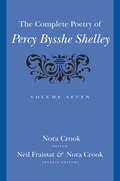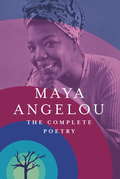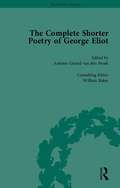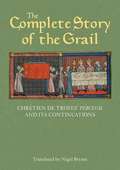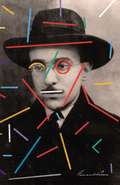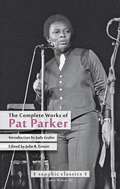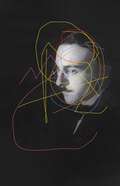- Table View
- List View
The Complete Poems of Sappho
by Willis BarnstoneSappho's thrilling lyric verse has been unremittingly popular for more than 2,600 years--certainly a record for poetry of any kind--and love for her art only increases as time goes on. Though her extant work consists only of a collection of fragments and a handful of complete poems, her mystique endures to be discovered anew by each generation, and to inspire new efforts at bringing the spirit of her Greek words faithfully into English.In the past, translators have taken two basic approaches to Sappho: either very literally translating only the words in the fragments, or taking the liberty of reconstructing the missing parts. Willis Barnstone has taken a middle course, in which he remains faithful to the words of the fragments, only very judiciously filling in a word or phrase in cases where the meaning is obvious. This edition includes extensive notes and a special section of "Testimonia": appreciations of Sappho in the words of ancient writers from Plato to Plutarch. Also included are a glossary of all the figures mentioned in the poems, and suggestions for further reading.
The Complete Poems: The Complete Civil War Poems
by Walt WhitmanIn 1855 Walt Whitman published Leaves of Grass, the work which defined him as one of America's most influential voices, and which he added to throughout his life. A collection of astonishing originality and intensity, it spoke of politics, sexual emancipation and what it meant to be an American. From the joyful 'Song of Myself' and 'I Sing the Body Electric' to the elegiac 'When Lilacs Last in the Dooryard Bloom'd', Whitman's art fuses oratory, journalism and song in a vivid celebration of humanity.
The Complete Poems: The Complete Poems And Selected Letters
by John KeatsKeats’s first volume of poems, published in 1817, demonstrated both his belief in the consummate power of poetry and his liberal views. While he was criticized by many for his politics, his immediate circle of friends and family immediately recognized his genius. In his short life he proved to be one of the greatest and most original thinkers of the second generation of Romantic poets, with such poems as ‘Ode to a Nightingale’, ‘On First Looking into Chapman’s Homer’ and ‘La Belle Dame sans Merci’. While his writing is illuminated by his exaltation of the imagination and abounds with sensuous descriptions of nature’s beauty, it also explores profound philosophical questions.John Barnard’s acclaimed volume contains all the poems known to have been written by Keats, arranged by date of composition. The texts are lightly modernized and are complemented by extensive notes, a comprehensive introduction, an index of classical names, selected extracts from Keats’s letters and a number of pieces not widely available, including his annotations to Milton’s Paradise Lost.
The Complete Poetry
by George Herbert<P>George Herbert wrote, but never published, some of the greatest English poetry, recording in an astonishing variety of forms his inner experiences of grief, recovery, hope, despair, anger, fulfilment and - above else - love.<P> This book collects Herbert's complete poetry.
The Complete Poetry
by George HerbertA wonderful edition of Herbert's poetry, edited by his acclaimed biographer John Drury and including elegant new translations of his Latin verse by Victoria Moul.George Herbert wrote, but never published, some of the very greatest English poetry, recording in an astonishing variety of forms his inner experiences of grief, recovery, hope, despair, anger, fulfilment and - above all else - love. This volume, edited by John Drury, collects Herbert's complete poetry - including such classics of English devotional poetry as 'The Altar', Easter-Wings' and 'Love'. It also includes the verse Herbert wrote in Latin, newly translated into English by Victoria Moul.George Herbert was born in 1593 and died at the age of 39 in 1633, before the clouds of civil war gathered. He showed worldly ambition and seemed sure of high public office and a career at court, but then for a time 'lost himself in a humble way', devoting himself to the restoration of a church and then to his parish of Bemerton, three miles from Salisbury. When in the year of his death his friend Nicholas Ferrar published Herbert's poems under the title The Temple, his fame was quickly established.John Drury is Chaplain and Fellow of All Souls College, Oxford. His books include The Burning Bush (1990), Painting the Word (1999), and, most recently, Music at Midnight, the culmination of a lifetime's interest in Herbert.Victoria Moul is Lecturer in Latin Literature and Language at Kings College London. She is author of Jonson, Horace and the Classical Tradition (2010) and editor of Neo-Latin Literature (2014).
The Complete Poetry and Essential Prose of John Milton
by John Milton William Kerrigan John Rumrich Stephen M. FallonJohn Milton is, next to William Shakespeare, the most influential English poet, a writer whose work spans an incredible breadth of forms and subject matter. The Complete Poetry and Essential Prose of John Milton celebrates this author's genius in a thoughtfully assembled book that provides new modern-spelling versions of Milton's texts, expert commentary, and a wealth of other features that will please even the most dedicated students of Milton's canon. Edited by a trio of esteemed scholars, this volume is the definitive Milton for our time.In these pages you will find all of Milton's verse, from masterpieces such as Paradise Lost-widely viewed as the finest epic poem in the English language-to shorter works such as the Nativity Ode, Lycidas,, A Masque and Samson Agonistes. Milton's non-English language sonnets, verses, and elegies are accompanied by fresh translations by Gordon Braden. Among the newly edited and authoritatively annotated prose selections are letters, pamphlets, political tracts, essays such as Of Education and Areopagitica, and a generous portion of his heretical Christian Doctrine. These works reveal Milton's passionate advocacy of controversial positions during the English Civil War and the Commonwealth and Restoration periods. With his deep learning and the sensual immediacy of his language, Milton creates for us a unique bridge to the cultures of classical antiquity and medieval and Renaissance Christianity. With this in mind, the editors give careful attention to preserving the vibrant energy of Milton's verse and prose, while making the relatively unfamiliar aspects of his writing accessible to modern readers. Notes identify the old meanings and roots of English words, illuminate historical contexts-including classical and biblical allusions-and offer concise accounts of the author's philosophical and political assumptions. This edition is a consummate work of modern literary scholarship.ays, but it is highly unlikely that any of the tributes he receives will do as much for him as the appearance of the Modern Library edition of his collected poetry and selected prose. The edition is a model of its kind, well designed and attractively produced. There are scholarly but unintimidating footnotes and helpful introductions to the major works. Spelling and punctuation have been modernized -- a difficult decision but the right one....A great deal has been packed in, but Milton has still been left room to breathe. The whole enterprise is meant to be reader-friendly, and it succeeds." -- The Wall Street Journal"This magnificent edition gives us everything we need to read Milton intelligently and with fresh perception. You could take it to a desert island, or just stay home and further your education in a great writer."-William H. Pritchard, Amherst College"For generations of readers Milton has been the measure of both eloquence and nobility of mind. For the next generation this new Modern Library volume will be the standard: it is meticulously edited, full of tactful annotations that set the stage for his work and his times, and it brings Milton, as a poet and a thinker, vividly alive before us."-Robert Hass"Years ago I began a series of poems about Milton and his daughters. Ever since, I have been combing through Milton's poems and prose for those moments when the poet would turn and speak to the poet in me. It is in the new Kerrigan-Rumrich-Fallon edition that I now find prompt rejoinders to questions, ready clarifications of problems, and a more intimate dimension of that formidable adjective Miltonic." -Richard Howard "A superb edition of the great poet, with modernized spelling, lucid introductions to each work, illuminating footnotes, and fresh prose translations of poems in Latin, Greek, and Italian. This will surely be the edition of choice for teachers, students, and general readers too."-Leo Damrosch, Harvard University"The introductions alone constitute a fine new book on Milton, beautifully written, challenging and balanced, with equal care and insight given to textual, biographical, historic...
The Complete Poetry and Prose of William Blake
by William Blake Harold Bloom David V. ErdmanSince its first publication in 1965, this edition has been widely hailed as the best available text of Blake's poetry and prose. Now revised, it includes up-to-date work on variants, chronology of poems and critical commentary by Harold Bloom. An "Approved Edition" of the Center for Scholarly Editions of the Modern Language Association.
The Complete Poetry and Selected Prose of John Donne
by John DonneThis Modern Library edition contains all of John Donne's great metaphysical love poetry. Here are such well-known songs and sonnets as "A Valediction: Forbidding Mourning," "The Extasie," and "A Nocturnall Upon S. Lucies Day," along with the love elegies "Jealosie," "His Parting From Her," and "To His Mistris Going to Bed." Presented as well are Donne's satires, epigrams, verse letters, and holy sonnets, along with his most ambitious and important poems, the Anniversaries. In addition, there is a generous sampling of Donne's prose, including many of his private letters; Ignatius His Conclave, a satiric onslaught on the Jesuits; excerpts from Biathanatos, his celebrated defense of suicide; and his most famous sermons, concluding with the final "Death's Duell." "We have only to read [Donne]," wrote Virginia Woolf, "to submit to the sound of that passionate and penetrating voice, and his figure rises again across the waste of the years more erect, more imperious, more inscrutable than any of his time."
The Complete Poetry of Aimé Césaire: Bilingual Edition
by Clayton Eshleman Aimé Césaire A. James ArnoldThe Complete Poetry of Aimé Césaire gathers all of Cesaire’s celebrated verse into one bilingual edition. The French portion is comprised of newly established first editions of Césaire’s poetic œuvre made available in French in 2014 under the title Poésie, Théâtre, Essais et Discours, edited by A. J. Arnold and an international team of specialists. To prepare the English translations, the translators started afresh from this French edition. Included here are translations of first editions of the poet’s early work, prior to political interventions in the texts after 1955, revealing a new understanding of Cesaire’s aesthetic and political trajectory. A truly comprehensive picture of Cesaire’s poetry and poetics is made possible thanks to a thorough set of notes covering variants, historical and cultural references, and recurring figures and structures, a scholarly introduction and a glossary. This book provides a new cornerstone for readers and scholars in 20th century poetry, African diasporic literature, and postcolonial studies.
The Complete Poetry of John Milton
by John MiltonThe first complete annotated edition of Milton's poetry available in a one-volume paperback. The text is established from original sources, with collations of all known manuscripts, chronology and verbal variants recorded. Works in Latin, Greek and Italian are included with new literal translations.
The Complete Poetry of Percy Bysshe Shelley
by Neil Fraistat Donald H. ReimanThe first American edition of Shelley's complete poetry since 1892—with more poems, fragments, and collations than any previous collective edition.Winner of the Richard J. Finneran Award of the Society for Textual Scholarship, CHOICE Outstanding Academic Title of the Choice ACRLA milestone in literary scholarship, the publication of the Johns Hopkins edition of The Complete Poetry of Percy Bysshe Shelley makes available for the first time critically edited clear texts of all poems and translations that Shelley published or circulated among friends, as well as diplomatic texts of his significant incomplete poetic drafts and fragments. Edited upon historical principles by Donald H. Reiman and Neil Fraistat, the multi volume edition will offer more poems and fragments than any previous collective edition, arranged in the order of their first circulation. These texts are followed by the most extensive collations hitherto available and detailed commentaries that describe their contextual origins and subsequent reception. Rejected passages of released poems appear as supplements to those poems, while other poetic drafts that Shelley rejected or left incomplete at his death will be grouped according to either their publication histories or the notebooks in which they survive.Volume One includes Shelley's first four works containing poetry (all prepared for publication before his expulsion from Oxford), as well as "The Devil's Walk" (circulated in August 1812), and a series of short poems that he sent to friends between 1809 and 1814, including a bawdy satire on his parents and "Oh wretched mortal," a poem never before published. An appendix discusses poems lost or erroneously attributed to the young Shelley."These early poems are important not only biographically but also aesthetically, for they provide detailed evidence of how Shelley went about learning his craft as a poet, and the differences between their tone and that of his mature short poetry index a radical change in his self-image... The poems in Volume I, then, demonstrate Shelley's capacity to write verse in a range of stylistic registers. This early verse, even in its most abandoned forays into Sensibility, the Gothic, political satire, and vulgarity—perhaps especially in these most apparently idiosyncratic gestures—provides telling access to its own cultural moment, as well as to Shelley's art and thought in general."—from the Editorial Overview
The Complete Poetry of Percy Bysshe Shelley
by Neil Fraistat Nora CrookThe latest volume of the acclaimed and magisterial Hopkins Press edition of Percy Bysshe Shelley's poetry, covering the years 1818 to early 1820, the first phase of Shelley's Italian period. <P><P> "You talk Utopia," says the worldly Count Maddalo, reproaching the idealistic Julian in Julian and Maddalo. Inspired by conversations conducted on horseback near Venice between the two notorious exiled poets, Shelley and Byron, this poem was among the first of the masterpieces that Shelley wrote after moving with his family in March 1818 from England to post-Napoleonic Italy. <P><P> The fourth volume of the Hopkins Complete Poetry of Percy Bysshe Shelley covers the years 1818–19 and part of 1820, when Britain was convulsed by popular agitation for the reform of Parliament and stifled by repressive laws against free speech. Among its other contents are The Cenci, an indictment of tyranny, domestic and political, probably the most actable of Romantic dramas; The Mask of Anarchy, the "greatest poem of political protest ever written in English" (too inflammatory to be published at the time); Peter Bell the Third, a brilliant satire on Wordsworth; the fiery sonnet "England in 1819"; an eclogue for women's voices (Rosalind and Helen); playful, sophisticated songs ("Love's Philosophy") and sad verses ("Stanzas, Written in dejection"). Shelley's publications received slashing reviews from politically motivated critics, who attacked his character and principles but acknowledged his poetic gifts. He broadened his scope and composed the most politically engaged poems of his maturity. To quote a Victorian editor, he "ceased to be a subject of Time, and became a citizen of Eternity." <P><P> As in previous volumes, meticulously edited texts are accompanied by discussions of the poems' composition, the influences they reflect, their publication, reception, and critical history, and detailed records of textual variants. Appendixes range from Mary Shelley's editorial notes to jottings by Shelley drawn from a hitherto unrecognized source for The Cenci. Readers will find in volume four original research, fresh readings, new contexts, and discoveries—hallmarks of this acclaimed edition.
The Complete Poetry of Percy Bysshe Shelley
by Percy Bysshe ShelleyWinners of an Honorable Mention from the Modern Language Association's Prize for a Distinguished Scholarly EditionWriting to his publisher in 1813, Shelley expressed the hope that two of his major works "should form one volume"; nearly two centuries later, the second volume of the Johns Hopkins edition of The Complete Poetry fulfills that wish for the first time. This volume collects two important pieces: Queen Mab and The Esdaile Notebook. Privately issued in 1813, Queen Mab was perhaps Shelley's most intellectually ambitious work, articulating his views of science, politics, history, religion, society, and individual human relations. Subtitled A Philosophical Poem: With Notes, it became his most influential—and pirated—poem during much of the nineteenth century, a favorite among reformers and radicals. The Esdaile Notebook, a cycle of fifty-eight early poems, exhibits an astonishing range of verse forms. Unpublished until 1964, this sequence is vital in understanding how the poet mastered his craft.As in the acclaimed first volume, these works have been critically edited by Donald H. Reiman and Neil Fraistat. The poems are presented as Shelley intended, with textual variants included in footnotes. Following the poems are extensive discussions of the circumstances of their composition and the influences they reflect; their publication or circulation by other means; their reception at the time of publication and in the decades since; their re-publication, both authorized and unauthorized; and their place in Shelley's intellectual and aesthetic development.
The Complete Poetry of Percy Bysshe Shelley
by Percy Bysshe ShelleyWinner of the 2013 Richard J. Finneran Award, Society for Textual ScholarshipOutstanding Academic Title, Choice"His name is Percy Bysshe Shelley, and he is the author of a poetical work entitled Alastor, or the Spirit of Solitude." With these words, the radical journalist and poet Leigh Hunt announced his discovery in 1816 of an extraordinary talent within "a new school of poetry rising of late."The third volume of the acclaimed edition of The Complete Poetry of Percy Bysshe Shelley includes Alastor, one of Shelley’s first major works, and all the poems that Shelley completed, for either private circulation or publication, during the turbulent years from 1814 to March 1818: Hymn to Intellectual Beauty, Mont Blanc, Laon and Cythna, as well as shorter pieces, such as his most famous sonnet, Ozymandias. It was during these years that Shelley, already an accomplished and practiced poet with three volumes of published verse, authored two major volumes, earned international recognition, and became part of the circle that was later called the Younger Romantics. As with previous volumes, extensive discussions of the poems’ composition, influences, publication, circulation, reception, and critical history accompany detailed records of textual variants for each work. Among the appendixes are Mary W. Shelley’s 1839 notes on the poems for these years, a table of the forty-two revisions made to Laon and Cythna for its reissue as The Revolt of Islam, and Shelley’s errata list for the same. It is in the works included in this volume that the recognizable and characteristic voice of Shelley emerges—unmistakable, consistent, and vital.
The Complete Poetry of Percy Bysshe Shelley
by Percy Bysshe ShelleyThis new volume of JHU Press's landmark Shelley edition contains posthumous poems edited from original manuscripts."The world will surely one day feel what it has lost," wrote Mary Shelley after Percy Bysshe Shelley's premature death in July 1822. Determined to hasten that day, she recovered his unpublished and uncollected poems and sifted through his surviving notebooks and papers. In Genoa during the winter of 1822–23, she painstakingly transcribed poetry "interlined and broken into fragments, so that the sense could only be deciphered and joined by guesses." Blasphemy and sedition laws prevented her from including her husband's most outspoken radical works, but the resulting volume, Posthumous Poems of Percy Bysshe Shelley (1824), was a magnificent display of Shelley's versatility and craftsmanship between 1816 and 1822. Few such volumes have made more difference to an author's reputation. The seventh volume of the acclaimed Complete Poetry of Percy Bysshe Shelley extracts from Posthumous Poems those original poems and fragments Mary Shelley edited. The collection opens with Shelley's enigmatic dream vision The Triumph of Life, the last major poem he began—and, in the opinion of T. S. Eliot, the finest thing he ever wrote. There follow some of the most famous and beautiful of Shelley's short lyrics, narrative fragments, two unfinished plays, and other previously unreleased pieces. Upholding the standards of accuracy and comprehensiveness set by previous volumes, every item in Volume 7 has been newly edited from the original manuscripts, in some cases superseding texts that have stood since 1870. Extensive appendixes contain Mary Shelley's preface to Posthumous Poems, Shelley's source for "Ginevra," and preparatory material for his play Charles the First. Wide-ranging discussions of the poems' composition, influences, publication, circulation, reception, and critical history accompany detailed records of textual variants for each work. The editorial overview and commentaries offer insights into Mary Shelley's editorial strategies while proposing surprising new contexts and redatings. Volumes 4 to 6 are in preparation.
The Complete Poetry: A Bilingual Edition
by César Vallejo Clayton EshlemanThis first translation of the complete poetry of Peruvian César Vallejo (1892-1938) makes available to English speakers one of the greatest achievements of twentieth-century world poetry. Handsomely presented in facing-page Spanish and English, this volume, translated by National Book Award winner Clayton Eshleman, includes the groundbreaking collections The Black Heralds (1918), Trilce (1922), Human Poems (1939), and Spain, Take This Cup from Me (1939). Vallejo's poetry takes the Spanish language to an unprecedented level of emotional rawness and stretches its grammatical possibilities. Striking against theology with the very rhetoric of the Christian faith, Vallejo's is a tragic vision--perhaps the only one in the canon of Spanish-language literature--in which salvation and sin are one and the same. This edition includes notes on the translation and a fascinating translation memoir that traces Eshleman's long relationship with Vallejo's poetry. An introduction and chronology provide further insights into Vallejo's life and work.
The Complete Poetry: The Complete Poetry
by Maya AngelouThe beauty and spirit of Maya Angelou&’s words live on in this complete collection of poetry, including her inaugural poem &“On the Pulse of Morning&”Throughout her illustrious career in letters, Maya Angelou gifted, healed, and inspired the world with her words. Now the beauty and spirit of those words live on in this new and complete collection of poetry that reflects and honors the writer&’s remarkable life. Every poetic phrase, every poignant verse can be found within the pages of this sure-to-be-treasured volume—from her reflections on African American life and hardship in the compilation Just Give Me a Cool Drink of Water &’fore I Diiie (&“Though there&’s one thing that I cry for / I believe enough to die for / That is every man&’s responsibility to man&”) to her revolutionary celebrations of womanhood in the poem &“Still I Rise&” (&“Out of the huts of history&’s shame / I rise / Up from a past that&’s rooted in pain / I rise&”) to her &“On the Pulse of Morning&” tribute at President William Jefferson Clinton&’s inauguration (&“Lift up your eyes upon / The day breaking for you. / Give birth again / To the dream.&”). Maya Angelou: The Complete Poetry also features her final long-form poems, including &“A Brave and Startling Truth,&” &“Amazing Peace,&” &“His Day Is Done,&” and the honest and endearing Mother: &“I feared if I let you go You would leave me eternally. You smiled at my fears, saying I could not stay in your lap forever&” This collection also includes the never-before-published poem &“Amazement Awaits,&” commissioned for the 2008 Olympic Games: &“We are here at the portal of the world we had wished for At the lintel of the world we most need. We are here roaring and singing. We prove that we can not only make peace, we can bring it with us.&” Timeless and prescient, this definitive compendium will warm the hearts of Maya Angelou&’s most ardent admirers as it introduces new readers to the legendary poet, activist, and teacher—a phenomenal woman for the ages.
The Complete Shorter Poetry of George Eliot (The Pickering Masters)
by Antonie Gerard van den BroekPresents George Eliot's shorter poetry. This volume includes an introduction, which discusses Eliot's interest in poetry verse and its relation to her prose and prose fiction; her recurring themes and motifs; the poetry's critical reception and its value to modern readers.
The Complete Story of the Grail (Arthurian Studies LXXXII)
by Chretien De Troyes Nigel BryantThe mysterious and haunting Grail makes its first appearance in literature in Chrétien de Troyes' 'Perceval' at the end of the 12th century. But Chrétien never finished his poem, leaving an unresolved story and an incomplete picture of the Grail. It was, however, far too attractive an idea to leave. Not only did it inspire quite separate works; his own unfinished poem was continued and finally completed by no fewer than four other writers. This book presents a translation of the whole of the rich and compelling body of tales contained in Chrétien's poem and its four Continuations.
The Complete Works of Alberto Caeiro: Bilingual Edition
by Fernando PessoaA bilingual companion to The Book of Disquiet, by Fernando Pessoa Here, in Margaret Jull Costa and Patricio Ferrari’s splendid new translations, are the complete poems of Alberto Caeiro, the imaginary “heteronym” coterie created by Fernando Pessoa, the Portuguese modernist master. Pessoa conceived Caeiro around 1914 and may have named him loosely after his friend, the poet Mário de Sa-Cárrneiro. What followed was a collection of some of Fernando Pessoa’s greatest poems, grouped under the titles The Keeper of Sheep, The Shepherd in Love, and Uncollected Poems. This imaginary author was a shepherd who spent most of his life in the countryside, had almost no education, and was ignorant of most literature; yet he (Pessoa) wrote some of the most beautiful and profound poems in Portuguese literature. This edition of The Complete Works of Alberto Caeiro is based on the magnificent Portuguese Tinta-da-China edition, published in Lisbon in 2016, and contains an illuminating introduction by the Portuguese editors Jerónimo Pizarro and Patricio Ferrari, some facsimiles of the original Portuguese texts, and prose excerpts about Caeiro and his work written by Fernando Pessoa well as his other heteronyms Álvaro de Campos and Ricardo Reis, and other fictitious authors such as Antonio Mora and I. I. Crosse.
The Complete Works of Kalidasa, Volume 1
by Chandra RajanThe first volume, of the three volumes contemplated, opens a window into the rich world of the imagination of a writer of whom it was once said that no second to him has been found.
The Complete Works of Pat Parker (Sapphic Classic)
by Pat ParkerThe Complete Works of Pat Parker includes Parker' s poetic masterwork, Movement in Black, as well as the poetry collection Jonestown & other madness, in addition to her published essays and other prose, along with two unpublished plays and a number of previously uncollected poems. Editor Julie R. Enszer notes, “ The breadth of creative output collected here demonstrates the seriousness of Parker' s overall work as a writer. Beginning in 1963, when she was nineteen years old, and continuing until she died in 1989, Parker took her work as a writer seriously. Gathering as much of it as possible into a single volume invites readers to take it seriously as well.”
The Complete Works of Álvaro de Campos
by Fernando PessoaA companion volume to Fernando Pessoa’s The Book of Disquiet and The Complete Works of Alberto Caeiro Álvaro de Campos is one of the most influential heteronyms created by Portugal’s great modernist writer Fernando Pessoa. According to Pessoa, Campos was born in Tavira (Algarve) in 1890 and studied mechanical engineering in Glasgow, although he never managed to complete his degree. In his own day, Campos was celebrated—and slandered—for his vociferous poetry imbued with a Whitman-inspired free verse, his praise of the rise of technology, and his polemical views that appeared in manifestos, interviews, and essays. Here in Margaret Jull Costa and Patricio Ferrari’s translations are the complete poems of Campos. This edition is based on the Portuguese Tinta-da-china edition and includes an illuminating introduction about Campos by the Portuguese editors Jerónimo Pizarro and Antonio Cardiello, facsimiles of original manuscripts, and a generous selection of Campos’s prose texts.
